In-House vs Outsourcing: Make the Right Choice for Your Business
February 01, 2022 • 1129 Views • 23 min read
Bohdan Vasylkiv
CEO & Co-Founder
Choosing and comparing in-house development vs outsourcing is an eternal challenge for any software development company. Regardless of what you choose, both software development approaches have their advantages and drawbacks. They are also equally suitable for startups and software product companies if put in a certain context.
Therefore, to make an informed and balanced choice, we have to understand the pros and cons of IT outsourcing and the benefits and challenges of working with an in-house software development team.
In-House Development Team in a Nutshell
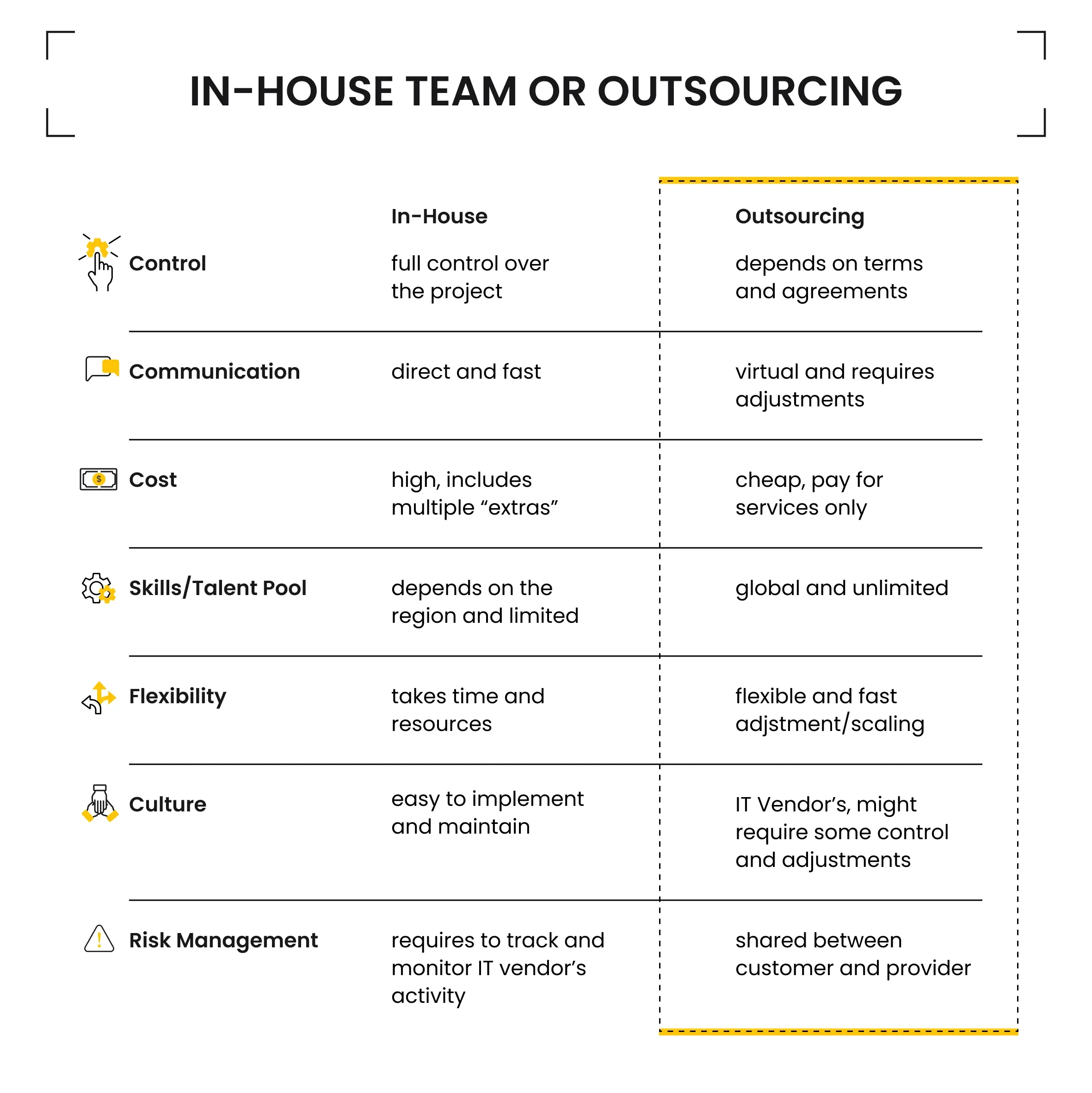
The in-house development model means traditionally working with developers.
In this case, business owners open the hiring position, go through the entire recruitment process, and choose the best candidates, who meet project requirements and business expectations.
As a business owner, you have to pay attention to the hard and soft skills of app developers for hire. Having an experienced developer with knowledge of working with specific industries and technologies is not enough. You have to ensure, that your potential employee will also suit the team, will be effective in developer collaboration, and won’t cause any trouble.
At this moment, you are not only a product or startup owner, but a team leader, who has to care about its interests as well. Also, you have to learn how to treat your developers and communicate with them. You can play the role of spectator, trying not to interfere with the development process, or have total control over each process of development lifecycle.
The first way of managing in-house software development teams is popular in startup development and IT outsourcing. The second is common for middle-sized and large software product companies like Amazon, PayPal, and others.
Advantages of In-House Team of Developers
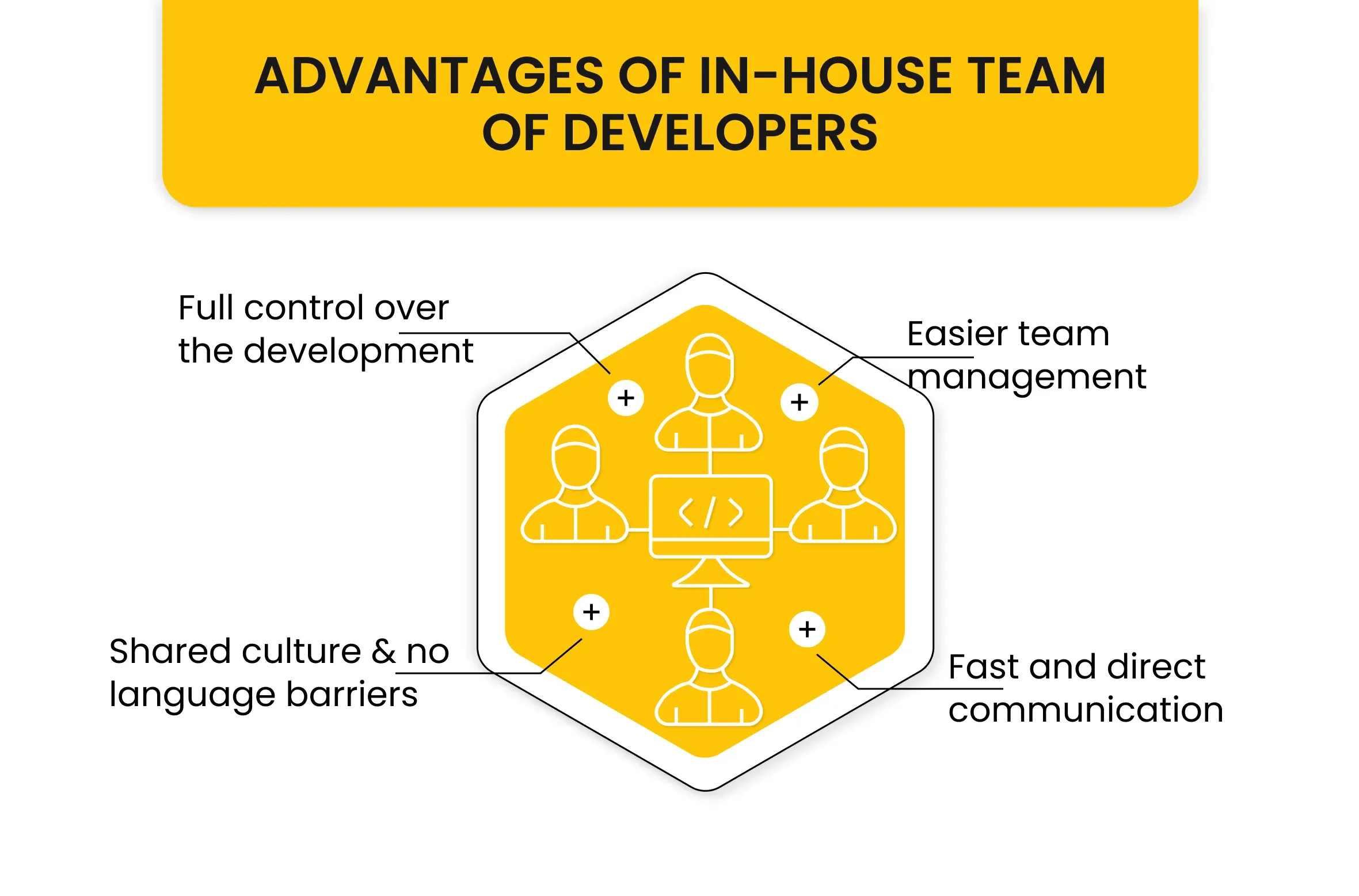
First of all, you hire a software development team with the same values and corporate culture. Your ideal candidates are the people, who will share their goals and values from the very beginning till the end. People who came up with a great idea and turned it into a product. People who believed in their brainchild and each other.
Working with an in-house software team, you have to be a genuine leader, a motivator, and a coach. You will work not only for the project, but for company growth, development, and success. To make it simple, in-house team management requires a more personal and engaged approach from the business owner.
Talking about the advantages of such a software development model, we can name at least a few:
- Easier team management
- Fast and direct communication
- Full control over the development
- Shared culture and no language barriers
Let’s consider each of them in more detail.
In-House Development Team Management
Developer collaboration and communication might become a real issue when working with remote software developers. At least, if it is organized poorly.
Fortunately, today there are numerous ways and methods to manage remote software development teams efficiently. However, such efficient remote developer collaboration and communication requires extra steps and effort.
On the other hand, in-house team management is much easier. You don’t have to take any steps to ensure team communication and collaboration when all app developers are located in the same place and are working from the office.
Physical access to any of the team members is an obvious advantage, which significantly simplifies developer collaboration and communication. This is especially important for software development team management. The working routine of project managers mostly consists of constant meetings and conversations. Therefore, an opportunity to meet with any team member by simply approaching them in the office is a real deal-breaker for in-house project managers.
It also excludes the need to use numerous software development collaboration tools, which may not only be inconvenient but significantly decrease security threats. For example, it helps to prevent online access to sensitive data like logins and passwords, or any other credentials, personal data, etc.
Finally, project managers of in-house development teams can easily check the activities of team members.
Fast and Direct Developer Communication
As was said before, one of the major advantages of having in-house developers is improved communication.
Having physical access to each other is important not only for project managers or business owners. It positively impacts many other aspects. For illustration, knowledge-sharing and onboarding processes are constant on-premises. In terms of in-house software development, developer collaboration is not limited to morning stand-ups or scheduled meetings. Instead, they will communicate during lunch, coffee breaks, etc.
As a result, new team members will engage and learn faster, having the possibility to ask questions during the day and get answers immediately. Besides, it can significantly boost the expertise of junior developers or newcomers: middle and senior developers are also visiting the office and are reachable.
All of the foregoing is especially important during the project launch. You get feedback and need to fix bugs rapidly and efficiently. It is way easier to do with an in-house team. Surveys showed that having a few people in your team and outsourcing some tasks can improve and speed up work.
In-House Software Development Drawbacks
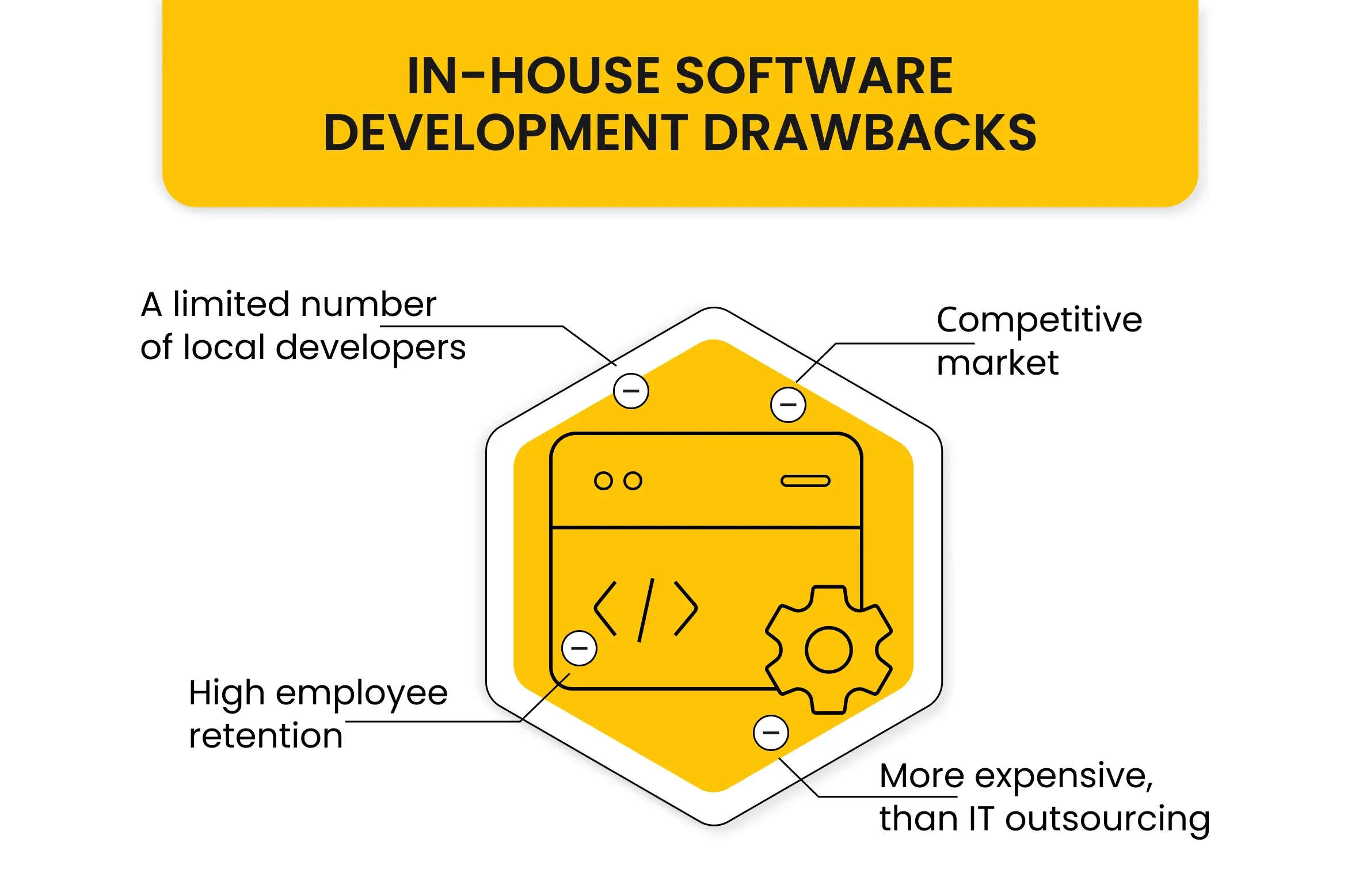
Unfortunately, in-house software development is not a perfect development model. It also has some weaknesses and challenges to deal with. The shortlist of the main challenges of the in-house development model is:
- It is more expensive, compared to IT outsourcing
- A limited number of local app developers for hire
- Highly competitive market
- High employee retention
Cost of Hiring Application Developers
All the advantages of an in-house software development team have a price tag.
Hiring an in-house software development team means, that the salary must correspond with at least the average salary in your region. If you are located in Eastern Europe - the developer salary is one thing. Yet, if your business is located in the United States - we are talking about totally different numbers.
Trusting Payscale statistics, the average salary of a developer in the US stands at 71, 508 dollars. This is a net salary, which doesn’t include sick leaves, vacations, health insurance, social security, and many other extra expenses.
All these expenses and notable differences in salary expectations between different regions are the reason why IT outsourcing appeared and became so popular. For instance, outsourcing software development to Eastern Europe can help to cut numerous expenses. To make it simple, in terms of IT outsourcing, you pay the developer's salary and company fee for the IT vendor. The rest is covered by the IT outsourcing company, you are working with. This is extremely valuable for small software product companies and startups.
Limited Pool of App Developers for Hire
In-house app developers for hire highly depend on the region.
Clearly, business owners won’t consider app developers for hire from Ukraine for their in-house team, based in Washington DC. This brings a lot of inconveniences and expenses. In such a case, business owners will have to deal at least with lots of paperwork and pay for the relocation of a candidate. Instead, it is easier to consider a local software engineer, or the one, based in the US. It is just a common sense.
Nevertheless, choosing local candidates brings other challenges. One of the major drawbacks - is the limit of local candidates on the market. Apart from your software company, there are other companies in your region. Everyone wants the best app developer for hire. Thus, the competition is huge, i.e. the salary expectations are high, and the number of candidates is low. Besides, don’t forget about employee retention.
High Market Competition
A highly competitive market brings countless limitations and requirements to cope with. To sum up, finding an app developer for hire is just half of the progress. Apart from proposing better working conditions, compared to the rivals, business owners also have to improve the working environment and ensure employee satisfaction constantly. All of it results in higher spending as well.
Cooperation with a remote dedicated development team on an IT outsourcing basis can cover this drawback. Hiring remote software developers gives your business access to a global pool of talent. In other words, business owners have more candidate options to choose from and can noticeably cut the cost of an app by choosing app developers from Eastern Europe, where salaries are smaller, yet the level of developer expertise is comparable with the US-based.
IT Outsourcing Development Model Explained

Long story short, the IT outsourcing model is based on delegating some tasks or entire projects to freelance app developers for hire or remote software development teams.
The IT outsourcing development model is growing its popularity due to numerous factors. To cut a long story short, one of the major advantages of IT outsourcing is that it covers most of the in-house software development drawbacks.
For instance, if you can’t find and hire developers in your region, you can easily contact an IT outsourcing company, which will provide you with a dedicated remote software development team, capable of delivering the software product.
Many people believe that remote software development has poor quality, compared to the results of in-house teams. Yet, this is false. The quality of software products highly depends on the skills of app developers for hire. Modern dedicated software development teams do not lack experience. The main difference between in-house and outsourced teams is their location.
Nevertheless, in-house vs outsourcing pros and cons still differ.
Pros Of IT Outsourcing Teams
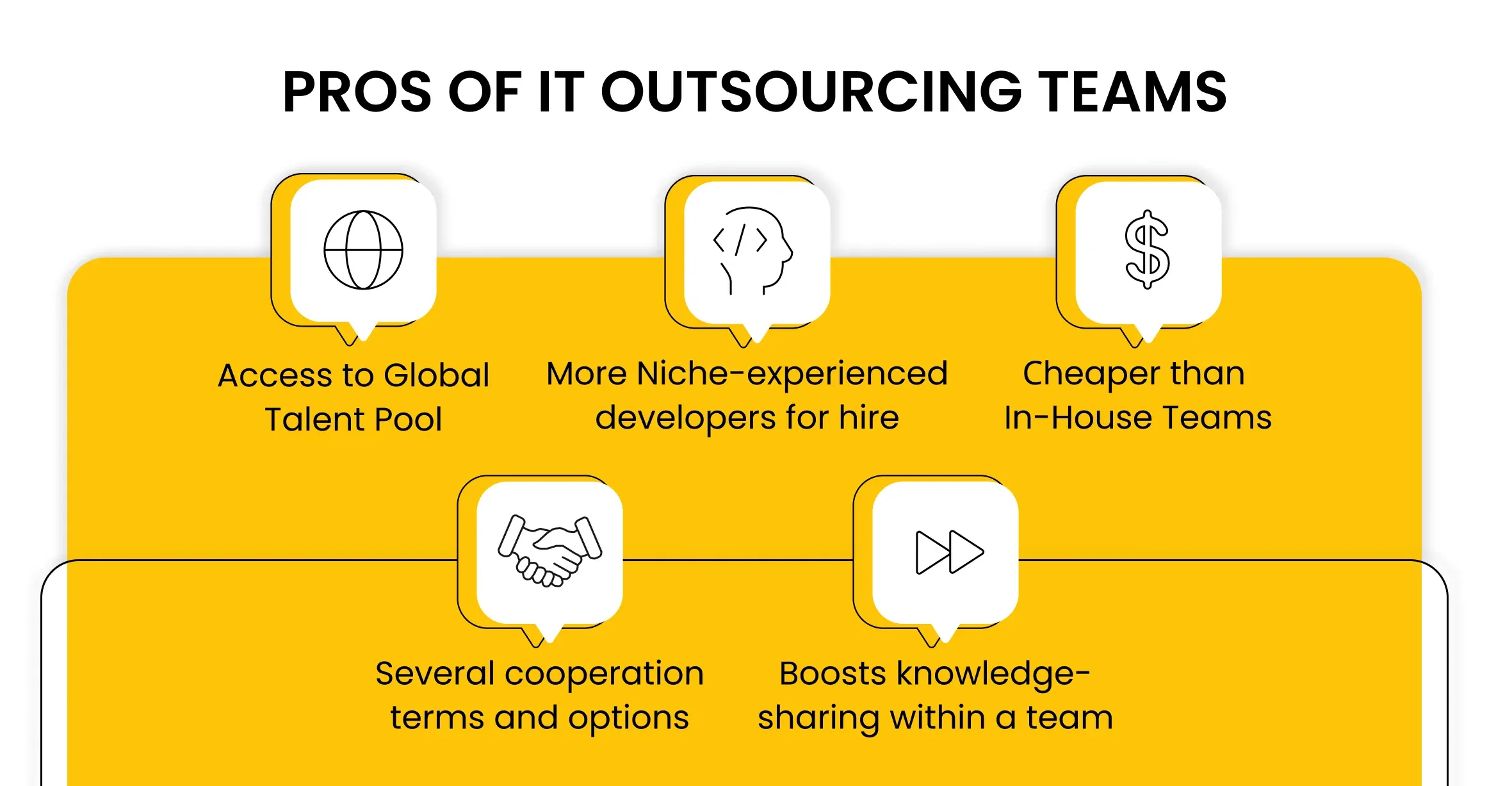
Cheaper Development Team Management and Hiring
As was mentioned above, the IT outsourcing development model expands the number of app developers for hire.
This also means that business owners can cut their expenses by hiring equally skilled software developers with lower salaries. Still, there are other ways to save your resources by outsourcing.
We already mentioned, that in-house team maintenance includes numerous extra spendings apart from their salary. At the same time, when you are outsourcing software development to Eastern Europe or any other popular IT outsourcing destination, all you care about - is the agreed terms of cooperation with the IT vendor.
You still have to choose between time and materials vs. fixed-price software development agreements. Still, all your concerts are related to the app development price. All the extra spending and finance management are internal processes of the IT outsourcing vendor.
As a result, business owners who outsource don’t have to think of paying the office rent, holding events, paying for sick leaves or vacations, etc. In other words, all you are paying for - is the software development itself.
Numerous App Developers For Hire
IT outsourcing gives access to a global pool of talent.
This brings two benefits of IT outsourcing at once:
- outsourcing software development provides business owners with options to choose from
- IT outsourcing allows for cutting expenses by hiring dedicated software development teams with lower salaries.
Frankly, IT outsourcing is divided into countless subtypes of development models. It includes offshore and nearshore development, dedicated software development teams and team extension services, cooperation with freelancers, etc. In other words, business owners not only have a wider options to choose from but also can find a software development model, which suits their needs. If startup owners need a single or a few developers, they can consider hiring freelancers or choosing team extensions for white-label development.
To sum up, IT outsourcing gives more options and suits almost all potential needs of a software development company.
Niche-Experienced Developers and Tech Stack Skills
One of the most underestimated advantages of IT outsourcing - is the experience of app developers for hire.
When you are outsourcing software development, you can hire developers, experienced in specific industries and familiar with certain tech stacks. Many business owners don’t pay enough attention to these factors, which is a mistake.
Having such experienced app developers on board creates numerous advantages for your software project. Apart from knowing the technologies to work with, niche-experienced developers significantly boost knowledge sharing in the software team. App developer for hire, who worked in the FinTech industry for a few years is a much better addition to a startup in the financial industry, than an expert in eCommerce.
Such developers bring their own experience and deep knowledge of the field. Apart from technical skills, they can propose numerous pieces of advice on the specifics of the field. For instance, many industries like Healthcare or FinTech have their legal regulations and restrictions. A person from the same field will have experience in working with such regulations and know what to and not to do.
When consulting and working with different specialists, you take advantage of their experience, points of view, and visions. You get greater chances to improve or even totally change your project, product, and working process.
IT Outsourcing Drawbacks
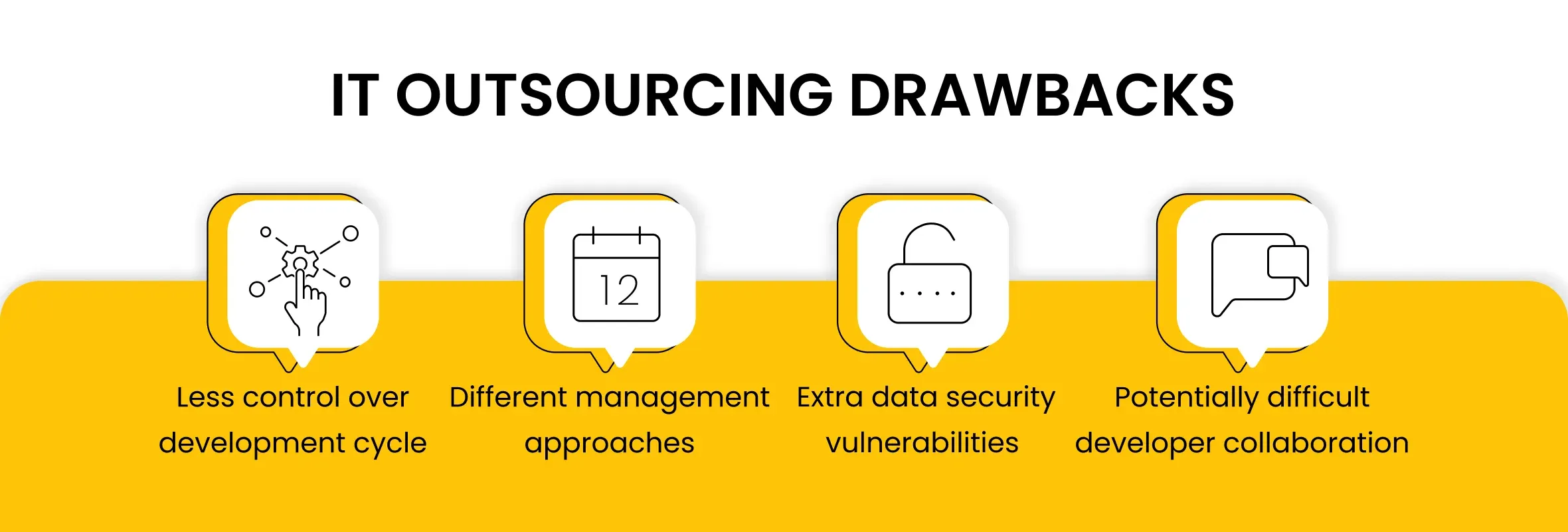
Talking about IT outsourcing drawbacks, it is possible to define a few major challenges to deal with:
- Issues with development team management
- Lack of control and product lifecycle management
- Developer collaboration and communication issues
- Data protection and security issues
Outsourcing Software Development Management
One of the most well-known issues of IT outsourcing is the lack of development team management.
When we compare in-house development vs outsourcing is the development team management. In-house team management is an easy task thanks to the physical access to each other that boosts developer collaboration and simplifies project management. At the same time, outsourcing software development management involves third-party communication tools. IT outsourcing requires the involvement of external software for sharing files, data, or reports. Additionally, it commonly includes various performance-tracking apps or online data storage.
Besides, IT outsourcing is based on different types of communications, the most common scheme is app developer > project manager > business owner.
Thus, outsourced developer collaboration has at least three different levels of communication:
- Developer-to-developer,
- Project manager to the development team,
- Project manager to a business owner.
The role of a project manager is much higher in terms of outsourcing software development than the in-house team model. The internal communication of IT outsourcing is also more complicated when comparing in-house vs outsourcing pros and cons.
Choosing Between In-House Development vs Outsourcing
Instead of opposing in-house development vs outsourcing, it is better to consider them as a mix.
Judging from our experience as an IT vendor, many companies commonly combine in-house teams and outsourcing development models to achieve better results. Still, it is a common approach for software product companies, that already have in-house developers and require extra hands. The only case, when there is a need to choose an in-house team or outsourcing is startup project development, when available resources are limited.
To make it simple, choosing an in-house team is great for:
- Developing a software product from scratch
- Better development team management and data security
- Long-term and complex projects
- Full control over product lifecycle management
At the same time, you should choose IT outsourcing when:
- Projects with limited resources
- When you need extra developers
- You require certain niche skills
- You need to hire developers for a Startup
Which One to Choose: In-House or Outsourcing?
Knowing all the pros and cons of each development approach, it is still hard to make a final choice, comparing in-house vs outsourcing software development. But what if we told you, there is also a third option?
Instead of considering which approach is more balanced for your project, take a step back and consider whether you can combine both methods, covering the drawbacks of each other. For instance, by building an in-house management team, responsible for various high-level tasks and processes, while choosing an outsourced dedicated software development team to perform the coding.
As a result, you will have full control over project management, while saving costs and time by outsourcing the coding process. For more information about combining both approaches, you can contact us and discuss your ideas.
What’s your impression after reading this?
Love it!
1
Valuable
1
Exciting
1
Unsatisfied
1
FAQ
Let us address your doubts and clarify key points from the article for better understanding.
What is the difference between an in-house team and outsourcing?
In-house Team: An in-house team refers to employees hired directly by your company to work on projects and tasks within your organization's premises or remotely under your direct supervision.
Outsourcing: Outsourcing involves delegating certain tasks or projects to external individuals or agencies, often located remotely. These individuals or ag
How do I decide between an in-house team and outsourcing?
Consider Nature of Work: Evaluate the nature of the work you need to be done. Tasks that require a high level of control, confidentiality, or are core to your business might be better suited for an in-house team. On the other hand, projects that are temporary, specialized, or non-core to your business could be outsourced.
Expertise Required: Assess whether your company possesses the necessary expertise in-house. If not, outsourcing to specialists can be more efficient and cost-effective.
Budget: Compare the costs of maintaining an in-house team versus outsourcing. While outsourcing can initially seem cheaper, long-term costs and quality considerations should be factored in.
Flexibility and Scalability: Consider the flexibility and scalability needed for your projects. Outsourcing allows you to easily scale resources up or down based on project requirements, whereas an in-house team might be less flexible in this regard.
Timeline: Evaluate the timeline for your project. Outsourcing can often lead to quicker project turnaround times due to access to specialized talent, while building an in-house team may take longer.
What are the benefits of an in-house team?
Control and Oversight: With an in-house team, you have direct control and oversight over all aspects of the project, including quality, timelines, and confidentiality.
Cultural Alignment: In-house teams are more likely to understand and align with your company's culture, values, and goals, leading to better collaboration and integration.
Long-term Investment: Building an in-house team can be seen as a long-term investment in your company's growth and capabilities.
Can I use a hybrid approach of both in-house and outsourcing?
Yes, many companies opt for a hybrid approach, where they maintain an in-house team for core functions while outsourcing non-core or specialized tasks. This approach allows for flexibility, scalability, and cost-effectiveness while retaining control over critical aspects of the business.
How do I transition from outsourcing to an in-house team or vice versa?
Transitioning between outsourcing and in-house teams requires careful planning and execution. Evaluate your current needs, assess the feasibility and costs of transitioning, and communicate transparently with all stakeholders involved. Gradual transitions with proper training and knowledge transfer can help mitigate disruptions and ensure a smooth transition process.
YOU MAY ALSO LIKE
Let’s talk!
This site uses cookies to improve your user experience. Read our Privacy Policy
Accept
Share this article